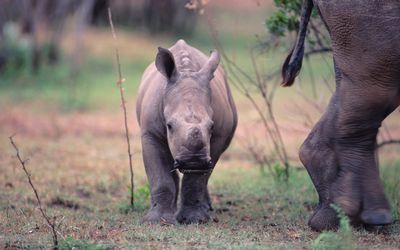LESS talk and more action is needed to curb escalating rhino poaching, the World Wildlife Fund (WWF) says in reaction to the latest death toll figures of the endangered species.
"Continued strategic action is needed along the entire illicit horn trafficking network to address the rhino poaching crisis in SA," the WWF said in a statement.
Figures released on Thursday by the Department of Environmental Affairs show that 1,215 rhinos were illegally killed in 2014, up 21% from the 1,004 animals lost in 2013. The 2014 total is almost double the 668 rhinos poached in 2012.
"In 2015, we need to keep working together on the strategic interventions which will have the greatest impact and result in greatest benefits for our rhinos," WWF rhino programme manager Jo Shaw said.
The poaching of rhino for their horns has become a benchmark internationally to measure the illicit trade in endangered wildlife. It includes the trade in other animal parts such as lion bones.
The main market for the illicit trade is Southeast Asia, lead by Vietnam — which has the greatest demand for rhino horn for unproven medicinal purposes and as a status symbol.
Environmental Affairs Minister Edna Molewa said at the press briefing on Thursday the good news was that the rate of poaching was slowing.
"However, we are still highly concerned about the killings," she said.
Ms Molewa said that efforts by the joint antipoaching task force, which includes SA National Parks, SA Police Service and the SA National Defence Force, have slowed the rate of killings. The success she referred to was the increase in arrests: 386 in 2014 from 343 the year before and 267 arrests in 2013.
She said the translocation of rhino from areas where they are vulnerable to "intensive-protection zones" was under way. Last year 56 rhino were moved from the Kruger National Park to more secure areas, and 200 were to be moved this year.
Ms Molewa also pointed to the agreements and the memorandum of understanding she had signed with Vietnam and China to try to reduce market demand for the horn as part of government’s overall strategy.
Environment department officials were not able to comment on efforts to bring down rhino-horn prices, saying there were no accurate numbers on the black market.
However, one department official said privately the price for 1kg of rhino horn in the Vietnamese capital, Hanoi, was about $65,000/kg.
Ms Molewa said her department was still appointing representatives to sit on a commission of inquiry on legalising the sale of rhino horn as a measure to control the price.
SA, which has a stockpile of rhino horn, will present a case for legalising the trade to the Convention on International Trade in Endangered Species of Wild Fauna and Flora next year.


















 Register for our
Register for our 




Post a comment